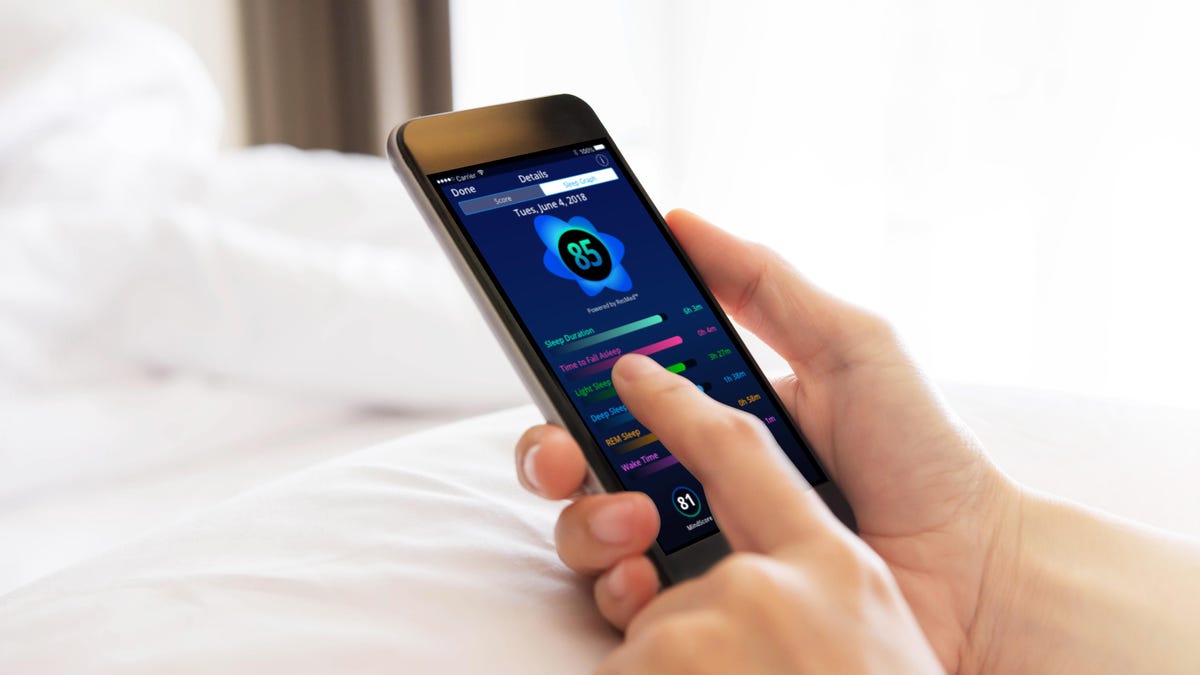SleepScore uses sonar on your phone to show you how bad your sleep is
The free phone app does away with bands and bed gadgets.

I have sleep apnea. I had to take a home sleep study years ago that used a fair number of wires to determine I had apnea in the first place. But a new app could make it much easier to spot sleeping problems.
SleepScore, a company co-founded by CPAP manufacturer ResMed, just released a free phone app that measures your sleep through sound waves through the phone's speaker. The app aims to help people potentially diagnose sleep problems from a bedside table, with no wrist sensors, bed sensors or extra bedside devices required.
SleepScore's phone app works much like its bedside gadget, SleepScore Max, does: It sends out inaudible sound waves (basically, sonar) to measure bodily movement overnight. The app measures sleep duration, the time it takes you to fall asleep, light sleep, deep sleep, REM sleep and wake time -- much like many sleep tracking fitness bands including the Fitbit Versa. It's sensitive enough to measure respiration and recognize REM (rapid eye movement) periods, according to SleepScore Labs CEO Colin Lawlor.
Lawlor says only 3 percent of sleep apnea sufferers have been diagnosed worldwide, which seems like an incredibly low number. The app's designed to raise awareness of sleep disorders by grading a night's sleep with an overall score: a 75-to-78 score is normal. Above that is good, and below that isn't. The app looks for patterns in sleep, and then makes recommendations to guide better sleep based on collected insights.
The app has some clear advantages: It's free, it's not super gadgety and it doesn't seem that invasive. I've only tried it for one night so far and got a SleepScore of 67. That's probably because I only slept for 4 hours and 38 minutes.
Did it work better than other sleep apps, gadgets and devices? Alas, it's impossible to judge against any baseline. There have been sleep-analyzing phone apps for years, most of them using a microphone or using phone accelerometers to measure motion when placed on a bed. SleepScore's app worked even with my bedside fan on and CPAP motor whirring.
Setup is simple enough: Once you've set up the phone running the app, it needs to be placed on a bedside table, plugged in or laid on a charger. I aimed my iPhone's speakers in the direction of my bed, and kept the phone charging on my nightstand since the app recommends a slight elevation. In the morning, the app uses a smart alarm that waits to wake up until lighter moments of sleep (I woke up before the smart alarm kicked in, thanks to my five-year-old kid's natural smart alarm instincts.)
The idea of an overall sleep score is clever. Most sleep-tracking apps I've tried make it hard to understand whether a night's sleep was a "success" or not. An app like this could also potentially help sell CPAP machines and other corrective devices. SleepScore Labs' Lawlor says the app doesn't make direct pitches to buy ResMed CPAP devices from within its app, but there is a telemedicine hook-in to a San Diego-based sleep study medical center, Better Night, for follow-up testing.
The free version tracks seven days of sleep. A subscription for $4 a month keeps a complete sleep history and will format records to send to your doctor. If you're planning on studying your sleep habits over a long time, that subscription sounds like it'll be necessary. The app syncs to Apple Health, and is only in the iOS App Store for now. An Android version of the app will be arriving by the end of June.
Tech Enabled: CNET chronicles tech's role in providing new kinds of accessibility.
Blockchain Decoded: CNET looks at the tech powering bitcoin -- and soon, too, a myriad of services that will change your life.

